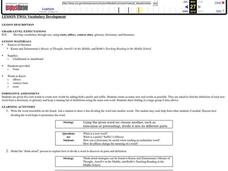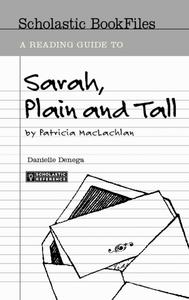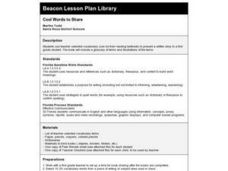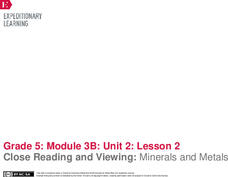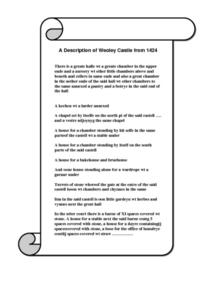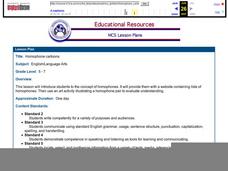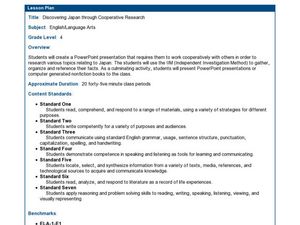K12 Reader
Glossary of Non-Violence
Make sure your class is sure of terminology when referring to the non-violent methods used in the civil rights movement. This glossary includes 19 terms paired with parts of speech and definitions.
Curated OER
Wrapping It Up
Class members develop their own glossaries for unfamiliar words in each chapter in Elizabeth George Speare’s The Sign of the Beaver. After recording the word, the page number on which the word appears, and its part of speech, they...
Curated OER
Reference Skills
Young scholars participate in an online scavenger hunt using the parts of a book to locate information. For this reference materials lesson, students locate the title, subtitle, table of contents and glossary. Young scholars then create...
Curated OER
Nouns and Adjectives
In this nouns and adjectives worksheet, students choose words from a word bank to fill in two blanks, an adjective and noun, to logically complete sentences. A mini-glossary helps students complete three sentences, some with multiple...
Curated OER
Vocabulary Development
What is a root word? What is a prefix? Suffix? Use these questions to spark a discussion amongst your language art learners. Then, start by writing the word irresistible on the board and have teams of learners attempt to create new words...
EngageNY
Reading an Interview: “Sloth Canopy Researcher: Bryson Voirin”
It's time to slow down and learn about sloths! Scholars read the first few questions of an interview with a sloth canopy researcher, looking for the gist. Next, they create a glossary in the back of their journals to add new scientific...
EngageNY
End of Unit Assessment, Part 1: On-Demand Essay “What Makes A Hurricane A Natural Disaster?”
It's time to refine writing and word choice. Learners work on Part 1 of their end of unit assessment by creating an essay titled What Makes a Hurricane a Natural Disaster? They use glossaries and graphic organizers from previous lessons...
Scholastic
A Reading Guide to Sarah, Plain and Tall
Eliminate the hard work of creating an entire literature unit with this reading guide for the novel Sarah, Plain and Tall. From background information about the author and her motivation for writing the story to reading comprehension...
Curated OER
Cool Words to Share
Fifth graders use teacher-selected vocabulary to present a written story to a first grade student. The book include a glossary of terms and illustrations of the terms. This is a great instructional activity for big/little buddies to do...
Curated OER
Lesson Six: Nonfiction Text Elements (Part One)
Students examine nonfiction text elements in preparation for writing a nonfiction book about Lewis and Clark. In this social studies/language arts lesson, students discuss the term research and complete a cluster map. Additionally,...
Saddleback Educational Publishing
The Jungle Book: Study Guide
Delve into The Jungle Book by Rudyard Kipling with a helpful study guide. Crossword puzzles, comprehension questions, character descriptions, chapter summaries, and vocabulary exercises connect readers with the classic text of a boy and...
EngageNY
Close Reading and Viewing: Minerals and Metals
How easy is it to live off the land? Scholars read Minerals and Metals in Your Life and discuss how Canada's natural resources meet the needs of the people. Pupils watch a brief video and discuss the gist of the text and video. They then...
Curated OER
A Description of Weoley Castle From 1424
In this description of Weoley Castle worksheet, students read a description of the castle in old English and refer back to the glossary for interpretation of certain words and phrases.
Curated OER
Homophone Cartoons
A terrific lesson plan on homophones awaits your youngsters. First, pupils access a website that contains lists of homophones. Then, it's time to get creative! Everyone gets a piece of poster board and they create a homophone cartoon -...
Curated OER
Discovering Japan Through Cooperative Research
Search a variety of sources to create a multimedia or book project about Japan. Learners use the independent investigation method to plan and conduct research about Japan. They use the information they discover to create a computer book...
Curated OER
Antonyms, synonyms and homophones
Shed light on what antonyms, synonyms, and homophones are. In this lesson, upper elementary schoolers create pairs using an antonym, a homophone, and/or a synonym. Then they play an antonym matching game.
Curated OER
A Research Project and Article For the Natural Inquirer
Get your class to use the scientific process to solve a scientific problem. They utilize the Natural Inquirer magazine to identify a research question which they write an introduction to and collect data to answer. They use graphs,...
Curated OER
Paraphrasing and Summarizing
Read an article about the migration of our ancestors and write a paragraph. Pupils paraphrase and summarize to restate the information found in a nonfiction text. They write a shortened version of the reading to demonstrate the...
Curated OER
Analyzing Two or More Nonfiction Texts
How does recognizing the author's purpose help you draw conclusions about a topic? Using two articles (both are attached), learners brainstorm why each author wrote each article. Are their purposes similar or different? Learners use a...
Curated OER
Writing and Presenting a Fable Using Research
Elementary and middle schoolers research animal facts and use them in a fable. First, they pair-share to find animal traits to use in writing a fable. They then complete a prewriting worksheet. After going through the writing process,...
Night of Mystery
Pirate Words and Phrases
Avast, ye mateys! A full dictionary of pirate phrases and words is sure to get your little pirates in a mood for sailing, reading, or writing. It features a basic list of terms as well as a more extensive dictionary for your class to be...
University Interscholastic League
English Lesson to Prepare for UIL Spelling and Vocabulary Contest
"i before e. . ." Spelling is easier if kids know the eight basic spelling rules contained in this resource packet.
Contra Costa Health Services
Youth Power Curriculum
Want to help foster teen leadership in your school? Pave the road to success with a well-designed unit that promotes planning skills, organization, and communication. Pupils participate in projects to gain an understanding of creating an...
Teach It Primary
The Pied Piper of Hamelin
Six tasks make up a lesson plan designed to reinforce comprehension and language skills using the poem "The Pied Piper" by Robert Browing. Scholars discuss and define unknown words, identify adjectives and onomatopoeia, review complex...
Other popular searches
- Using Glossaries
- Glossaries Language Arts
- Geography Glossaries
- Glossaries and Indexes
- Making Glossaries
- Glossaries Dictionaries
- Economic Glossaries
- Using Glossaries and Indexes
- Use Glossaries and Indexes






